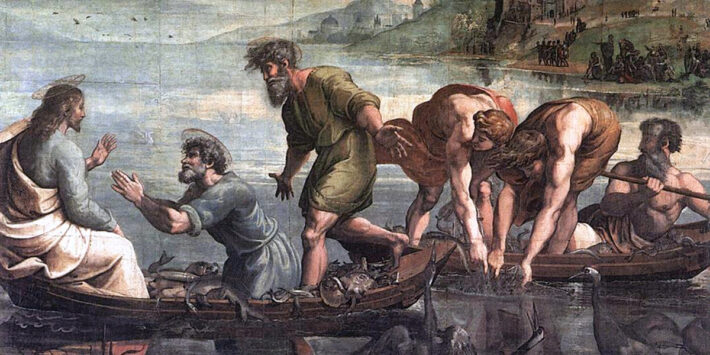Christian Art | Fishers Of Men
Mark 1: 14-20 – 3rd Sunday Year B & Monday Week 1 Ordinary Time (Audio Bible KJV, Spoken Word)
14 Now after that John was put in prison, Jesus came into Galilee, preaching the gospel of the kingdom of God,
15 And saying, The time is fulfilled, and the kingdom of God is at hand: repent ye, and believe the gospel.
16 Now as he walked by the sea of Galilee, he saw Simon and Andrew his brother casting a net into the sea: for they were fishers.
17 And Jesus said unto them, Come ye after me, and I will make you to become fishers of men.
18 And straightway they forsook their nets, and followed him.
19 And when he had gone a little further thence, he saw James the son of Zebedee, and John his brother, who also were in the ship mending their nets.
20 And straightway he called them: and they left their father Zebedee in the ship with the hired servants, and went after him.
The time is come. Jesus has been baptised by John. He has spent time alone in the wilderness, symbolic of the Exodus wanderings, and is come to Galilee to begin his ministry. His first act is to call the first of the apostles to their new vocation. In Mark’s Gospel, as in Matthew’s, this follows upon the arrest of John the Baptist. This clearly differs from the account of John’s Gospel, while the Gospel of Luke could be seen as presenting a more detailed and less stylised account of the meeting of Christ with the fishermen.
There is, though, a consistent message throughout the Gospels: that Christ’s ministry begins where John gives way. The time of expectation of the coming of the Messiah is complete. Christ is here; the kingdom of God is at hand. History is to be fulfilled. There is a call to repentance for past sins, John’s message remains, and now additionally to believe the good news of this new present tense. Here and now, we are called to know Christ’s imminence. We are called to faith and action.
The brothers Simon and Andrew work together at their trade as fishermen. Their brotherhood is significant; we may think of the disciples being sent out to teach in pairs. There is companionship: it is not good for a man to be alone.
Their livelihood is already one of life-giving. They work to draw food from the Sea of Galilee. It is a good, honest, regular job. These are normal people. So Jesus calls us, in our condition of life, however modest that may be. And here particularly we hear a new term: fishers of men. A great transformation takes place when Christ calls to the brothers. There is a poetic effect as their regular job is about to give way to the work of salvation in Jesus.
Christ’s words are brief and to the point. They are also a command, rather than request. ‘Come ye after me.’ Christ’s call to us precedes our acceptance of grace. He chooses us. We live in relationship with Christ by divine command. In an important sense, it is not our decision; we can only accept Christ’s gift to us. Simon and Andrew obey immediately. With no hesitation, the servants drop the nets of their old way of life and follow their master.
James and John similarly work as fishermen. They are mending their nets. We see their hard work maintaining the tools of their trade, and we anticipate the great catch that is to come.
There is here an additional and poignant note. Their father Zebedee is with them. Upon Jesus’ call, they leave their father along with their old trade to follow Jesus. They are brothers, they have each other’s companionship, and yet we sense the enormity of the task they are setting out on as they leave their father behind. We wonder as well what their father may have thought then. It must have been very difficult for him to watch his sons depart. There is a loneliness and also great dignity as he watches them go. And there is bravery in the sons in being a part of this scene – of growing up and leaving our parents’ home. The call to Christ may indeed take us far from our comfort zones. Our new life in Christ transcends our old.
![]()

Audio Bible KJV | Endnotes
Fishers Of Men
The passage in Mark 1:14-20 tells the story of Jesus calling his first disciples, who were fishermen by trade. Jesus approached Simon and Andrew, and then James and John, while they were casting their nets into the sea. Jesus called out to them, saying: ‘Follow me, and I will make you fishers of men.’ Without hesitation, they left their nets and followed Jesus.
The phrase ‘fishers of men’ has become a well-known and often-used metaphor for evangelism, which is the spreading of the gospel and winning of souls for Christ. This passage teaches us several important lessons about evangelism and discipleship.
Firstly, it teaches us that the call to evangelism is a call to leave behind our former way of life and follow Jesus Christ wholeheartedly. The disciples did not simply add Jesus to their list of interests or hobbies; they left everything to follow him. Likewise, as Christians, our call to evangelism should be a central aspect of our lives, requiring full commitment.
Secondly, the phrase ‘fishers of men’ suggests that evangelism requires skill and effort, just like fishing. As fishermen need to know the habits and movements of fish, so too must evangelists understand the needs and struggles of those they seek to reach. They must learn to communicate the Gospel in a way that is understandable and relevant to their audience.
In Christian tradition, the concept of evangelism is closely linked with the mission of the Church to spread the good news of Christ to all nations. The Catechism of the Catholic Church states that ‘evangelization is in fact the grace and vocation proper to the Church, her deepest identity’ (CCC 905). The Catechism also emphasizes the importance of evangelizing through both words and actions, stating that ‘the witness of a Christian life and good works done in a supernatural spirit have great power to draw men to the faith’ (CCC 2044).
In Protestant tradition, evangelism has also been a central focus. The famous evangelist, Billy Graham, once said: ‘Evangelism is not a spectator sport. We are all called to get involved.’ Billy Graham emphasized the importance of personal evangelism, where every Christian shares the gospel with those they come into contact with in their everyday lives.
The call to evangelism is not limited to just a select few, but is for all believers. The Apostle Saint Paul writes in 2 Timothy 4:5: ‘But watch thou in all things, endure afflictions, do the work of an evangelist, make full proof of thy ministry.’ This verse reminds us that we should always be ready and willing to share the gospel with others, even if it means facing opposition or persecution.
When Jesus called the fishermen, Jesus did not present a complicated or abstract theological argument, nor did Jesus try to persuade them with signs or miracles. Instead, Jesus simply said: ‘Follow me.’ This direct and simple approach was powerful enough to immediately draw the fishermen to Jesus.
Similarly, when we share the gospel with others, we do not need to have all the answers or present complex theological arguments. Instead, we should focus on sharing our own experiences with Christ and how he has changed our lives. By being authentic and transparent, we can show others the real-life impact of the Gospel.
Furthermore, as we seek to be ‘fishers of men’, we should also remember the importance of prayer. In Colossians 4:2-3, Saint Paul writes: ‘Continue in prayer, and watch in the same with thanksgiving; withal praying also for us, that God would open unto us a door of utterance, to speak the mystery of Christ.’ This passage reminds us that prayer is essential in preparing the hearts of those we seek to reach with the gospel.
Over the centuries, many Christians have emphasized the importance of evangelism. One such figure was John Wesley, founder of the Methodist movement. Wesley believed that the call to evangelize was not only a commandment from Christ, but also a sign of genuine faith. He once said: ‘You have nothing to do but to save souls. Therefore spend and be spent in this work. And go always, not only to those that need you, but to those that need you most.’
Pope Francis has emphasized the importance of evangelism and reaching out to those who have not yet encountered Christ. In his 2013 apostolic exhortation Evangelii Gaudium, Pope Francis called for a renewed focus on evangelization, saying: ‘I invite all Christians, everywhere, at this very moment, to a renewed personal encounter with Jesus Christ, or at least an openness to letting him encounter them; I ask all of you to do this unfailingly each day.’
Pope Francis has also emphasized the need for Christians to engage in a dialogue with those of other religions or no religion, as a means of sharing the gospel message. He has said: ‘We Christians should embrace with affection and respect Muslim immigrants to our countries in the same way that we hope and ask to be received and respected in countries of Islamic tradition.’
Furthermore, Pope Francis has stressed the importance of humility in evangelization, acknowledging that we are all sinners in need of God’s grace. He has said: ‘We are all sinners, and we need to give ourselves the chance to be forgiven. The Church is a place where we can find forgiveness, but we need to recognize our own sinfulness and need for repentance.’








